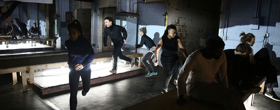ELECTRIC LUCIFER, Based on Bruce Haack's 1970s Concept Albums, Coming to The Kitchen

The Kitchen presents the world premiere of Jim Findlay's Electric Lucifer, an experimental rock opera based on the 1970s concept albums of the late Canadian electronic music pioneer Bruce Haack.
Having dreamed of creating a live show based on Haack's work since he first encountered the recordings in the 1990s, Findlay brings together a live band, radically new arrangements and additional original music by composer Philip White; a cast of performers led by interdisciplinary artist Okwui Okpokwasili as Lucifer; choreography by Raja Feather Kelly; and an outlandish operatic staging integrating video projection and scenography by Findlay and Jeff Sugg.
Performances of Electric Lucifer will take place January 9-13, 2018, at The Kitchen (512 West 19th Street). Tickets, $25 General ($20 for Members), will be available at thekitchen.org on November 15. A Kickstarter campaign to support and enhance the production elements of Electric Lucifer is currently live and ends on October 27, 2017.
When Findlay first discovered Haack's work, he was "blown away...by Haack's mad-scientist-like genius at teasing original sounds from his wildly inventive oddball machines." As Pitchfork explains, "Back then, electronic music wasn't a genre; it was a scientific discipline, and Haack was among its most fervent early adopters"; it was so arcane that Haack's most visible legacy came not from his one major label album release, or from his wild electronic inventions, but rather from his independently released kids' records and a few early appearances on television shows including "Mr. Roger's Neighborhood" and "What's My Line," on which he would demonstrate the seeds of this new world of musical creation. During his early career, he collaborated with electronic music luminaries Raymond Scott and Robert Moog and signed a contract with Columbia Records for his one major label release, in 1970. Despite disappointing sales and an end to his major label career, Haack continued making music until his death in 1988 including a curious collaboration with Russell Simmons on the 1982 song "Party Machine" and numerous other self-produced and -released albums. Haack has garnered a posthumous cult following for his many innovations; his influence spans the history of electronic music from Kraftwerk to Beastie Boys, Beck, MGMT, Gotye, and Animal Collective.
Findlay has reimagined and expanded Haack's 1970s concept albums The Electric Lucifer (1970) and The Electric Lucifer, Book II (1978) into a multimedia stage production that takes musical, thematic, and atmospheric inspirations from Haack's work. Not only was Findlay drawn to how Haack's work denoted and even provoked changing tides in music; he also appreciated Haack's prescient anticipation of the integration of machines into human biology while demonstrating a uniquely optimistic vision of what that might mean for our descendants. This innate curiosity towards technology is where Haack and Findlay's artistic sensibilities-divided by decades, and Haack's death in 1988-first seemed to intersect. "Plug it in, turn it on, see what happens. That sense of inquiry lies at the heart of both Bruce's and my work," says Findlay.
Electric Lucifer iswritten and directed by Jim Findlay, with music and lyrics by Bruce Haack, musical adaptation and additional original music by Philip White, choreography by Raja Feather Kelly, set and video design by Jeff Sugg and Jim Findlay, lighting design by Masha Tsimring, costume design by Enver Chakartash, sound design by Philip White, and dramaturgy by Ian Belton. The cast features Okwui Okpokwasili as The Electric Lucifer, Robert M. Johanson as Jesus, Brendan Connelly as the Archangel Gabriel, and Seth Braley, Nikki Colange,and Jake Denney as Lucifer's "Silverheads." The band includes Connolly, Shayna Dunkelman, Nathan Koci, and Lester St. Louis.
Jim Findlay works across boundaries as a theater artist, visual artist, and film-maker. His most recent work includes his original performances Vine of the Dead (2015), Dream of the Red Chamber (2014), Botanica (2012), and the direction and design of David Lang's the whisper opera, as well as the unreleased 3D film Botanica. His video installation in collaboration with Ralph Lemon, Meditation, is in the Permanent Collection of the Walker Art Center. He was a founding member of the Collapsable Giraffe and, in partnership with Radiohole, founded the Collapsable Hole, a multi-disciplinary artist led performance venue that recently relocated to Manhattan's West Village. In addition to his work as an independent artist, he maintains a long career as a collaborator with many theater, performance and music artists including Mallory Catlett, Bang on a Can, Daniel Fish, Aaron Landsman, David Lang, Michael Gordon, Ridge Theater, Ralph Lemon, the Wooster Group, Radiohole, Stew and Heidi Rodewald, and Julia Wolfe. His work has been seen at Lincoln Center, Carnegie Hall, BAM, Arena Stage, A.R.T. and over 50 cities internationally. In 2016 he received a Creative Capital Award for his newest project "Electric Lucifer" and in 2015 he received the Foundation for Contemporary Art Artist Grant. He was a MacDowell Colony Fellow in 2012 and 2016. Other recognition includes two Obie Awards, two Bessie Awards, two Princess Grace Awards, a Lortel and a Hewes Awards and residencies at Baryshnikov Arts Center, UCross, MassMOCA, and Mount Tremper Arts.
The Kitchen is one of New York City's most forward-looking nonprofit spaces, showing innovative work by emerging and established artists across disciplines. Our programs range from dance, music, performance, and theater to video, film, and art, in addition to literary events, artists' talks, and lecture series. Since its inception in 1971, The Kitchen has been a powerful force in shaping the cultural landscape of this country, and has helped launch the careers of many artists who have gone on to worldwide prominence. Follow The Kitchen on Facebook: facebook.com/TheKitchenNYC, Twitter: twitter.com/TheKitchen_NYC and Instagram: instagram.com/TheKitchen_NYC.
Videos

